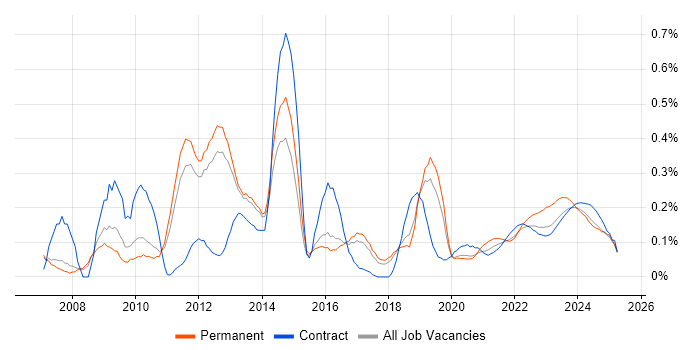ITIL Foundation Certificate
UK > Work from Home
The table below provides summary statistics for remote or hybrid work with a requirement for ITIL Foundation Certificate qualifications. It includes a benchmarking guide to the salaries offered over the 6 months leading up to 28 February 2026, comparing them to the same period in the previous two years.
| 6 months to 28 Feb 2026 |
Same period 2025 | Same period 2024 | |
|---|---|---|---|
| Rank | 341 | 403 | 481 |
| Rank change year-on-year | +62 | +78 | +151 |
| Permanent jobs citing ITIL Foundation Certificate | 46 | 23 | 57 |
| As % of all permanent jobs with remote/hybrid work options | 0.28% | 0.15% | 0.20% |
| As % of the Qualifications category | 0.95% | 0.52% | 0.76% |
| Number of salaries quoted | 38 | 15 | 48 |
| 10th Percentile | - | £30,993 | £27,500 |
| 25th Percentile | £30,500 | £39,375 | £42,938 |
| Median annual salary (50th Percentile) | £45,000 | £45,000 | £56,525 |
| Median % change year-on-year | - | -20.39% | +33.00% |
| 75th Percentile | £57,500 | £60,000 | £72,500 |
| 90th Percentile | £110,000 | £79,000 | £99,625 |
| UK median annual salary | £47,847 | £42,000 | £40,144 |
| % change year-on-year | +13.92% | +4.62% | +13.08% |
All Academic and Professional Certifications
Work from Home
ITIL Foundation Certificate falls under the Academic Qualifications and Professional Certifications category. For comparison with the information above, the following table provides summary statistics for all permanent job vacancies with remote or hybrid options requiring academic qualifications or professional certifications.
| Permanent vacancies requiring academic qualifications or professional certifications | 4,843 | 4,413 | 7,513 |
| As % of all permanent jobs with a WFH option | 29.43% | 29.50% | 27.00% |
| Number of salaries quoted | 2,619 | 2,402 | 5,504 |
| 10th Percentile | £31,250 | £32,750 | £32,500 |
| 25th Percentile | £45,000 | £45,879 | £42,500 |
| Median annual salary (50th Percentile) | £60,000 | £62,500 | £57,500 |
| Median % change year-on-year | -4.00% | +8.70% | -4.17% |
| 75th Percentile | £78,750 | £74,014 | £73,750 |
| 90th Percentile | £92,500 | £89,875 | £88,750 |
| UK median annual salary | £55,000 | £60,000 | £55,000 |
| % change year-on-year | -8.33% | +9.09% | -4.35% |
ITIL Foundation Certificate
Job Vacancy Trend for Remote/Hybrid Jobs
Historical trend showing the proportion of permanent IT job postings citing ITIL Foundation Certificate and offering remote or hybrid work options relative to all permanent IT jobs advertised.

ITIL Foundation Certificate
Salary Trend for Remote/Hybrid Jobs
Salary distribution trend for jobs with remote/hybrid work options citing ITIL Foundation Certificate.

ITIL Foundation Certificate
Salary Histogram for Remote/Hybrid Jobs
Salary distribution for jobs with remote/hybrid work options citing ITIL Foundation Certificate over the 6 months to 28 February 2026.
ITIL Foundation Certificate
Co-Occurring Skills & Capabilities in Remote/Hybrid Jobs by Category
The following tables expand on the one above by listing co-occurrences grouped by category. They cover the same employment type, locality and period, with up to 20 co-occurrences shown in each category:
